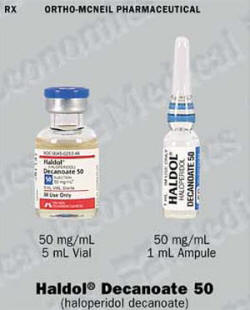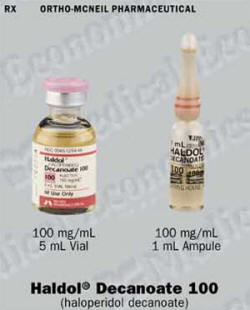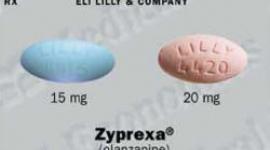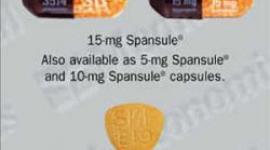Haldol (Haloperidol) Patient Information
Find out why Haldol is prescribed, side effects of Haldol, Haldol warnings, effects of Haldol during pregnancy, more - in plain English.
Generic name: Haloperidol
Brand name: Haldol
Pronounced: HAL-dawl
Why is this Haldol prescribed?
Haldol is used to reduce the symptoms of mental disorders such as schizophrenia. It is also prescribed to control tics (uncontrolled muscle contractions of face, arms, or shoulders) and the unintended utterances that mark Gilles de la Tourette's syndrome. In addition, it is used in short-term treatment of children with severe behavior problems, including hyperactivity and combativeness.
Some doctors also prescribe Haldol to relieve severe nausea and vomiting caused by cancer drugs, to treat drug problems such as LSD flashback and PCP intoxication, and to control symptoms of hemiballismus, a condition that causes involuntary writhing of one side of the body.
Most important fact about Haldol
Haldol may cause tardive dyskinesia--a condition characterized by involuntary muscle spasms and twitches in the face and body. This condition can be permanent, and appears to be most common among the elderly, especially women. Ask your doctor for information about this possible risk.
How should you take Haldol?
Haldol may be taken with food or after eating. If taking Haldol in a liquid concentrate form, you will need to dilute it with milk or water.
You should not take Haldol with coffee, tea, or other caffeinated beverages, or with alcohol.
Haldol causes dry mouth. Sucking on a hard candy or ice chips may help alleviate the problem.
--If you miss a dose...
Take it as soon as you remember. Take the rest of the doses for that day at equally spaced intervals. Do not take 2 doses at once.
--Storage instructions...
Store away from heat, light, and moisture in a tightly closed container. Do not freeze the liquid.
What side effects may occur with Haldol?
Side effects cannot be anticipated. If any side effects develop or change in intensity, inform your doctor as soon as possible. Only your doctor can determine if it is safe for you to continue taking Haldol.
- Side effects of Haldol may include: Abnormal secretion of milk, acne-like skin reactions, agitation, anemia, anxiety, blurred vision, breast pain, breast development in males, cataracts, catatonic (unresponsive) state, chewing movements, confusion, constipation, coughing, deeper breathing, dehydration, depression, diarrhea, dizziness, drowsiness, dry mouth, epileptic seizures, exaggerated feeling of well-being, exaggerated reflexes, excessive perspiration, excessive salivation, hair loss, hallucinations, headache, heat stroke, high fever, high or low blood pressure, high or low blood sugar, impotence, inability to urinate, increased sex drive, indigestion, involuntary movements, irregular menstrual periods, irregular pulse, lack of muscular coordination, liver problems, loss of appetite, muscle spasms, nausea, Parkinson-like symptoms, persistent abnormal erections, physical rigidity and stupor, protruding tongue, puckering of mouth, puffing of checks, rapid heartbeat, restlessness, rigid arms, feet, head, and muscles, rotation of eyeballs, sensitivity to light, skin rash, skin eruptions, sleeplessness, sluggishness, swelling of breasts, twitching in the body, neck, shoulders, and face, vertigo, visual problems, vomiting, wheezing or asthma-like symptoms, yellowing of skin and whites of eyes
Why should Haldol not be prescribed?
You should not take Haldol if you have Parkinson's disease or are sensitive to or allergic to the drug.
Special warnings about Haldol
You should use Haldol cautiously if you have ever had breast cancer, a severe heart or circulatory disorder, chest pain, the eye condition known as glaucoma, seizures, or any drug allergies.
Temporary muscle spasms and twitches may occur if you suddenly stop taking Haldol. Follow your doctor's instructions closely when discontinuing the drug.
This drug may impair your ability to drive a car or operate potentially dangerous machinery. Do not participate in any activities that require full alertness if you are unsure of your reaction to Haldol.
Haldol may make your skin more sensitive to sunlight. When spending time in the sun, use a sunscreen or wear protective clothing.
Avoid exposure to extreme heat or cold. Haldol interferes with the body's temperature-regulating mechanism, so you could become overheated or suffer severe chills.
Possible food and drug interactions when taking Haldol
Extreme drowsiness and other potentially serious effects can result if Haldol is combined with alcohol, narcotics, painkillers, sleeping medications, or other drugs that slow down the central nervous system.
If Haldol is taken with certain other drugs, the effects of either could be increased, decreased, or altered. It is especially important to check with your doctor before combining Haldol with the following:
 Antiseizure drugs such as Dilantin or Tegretol
Antiseizure drugs such as Dilantin or Tegretol
Antispasmodic drugs such as Bentyl and Cogentin
Blood-thinning medications such as Coumadin
Certain antidepressants, including Elavil, Tofranil, and Prozac
Epinephrine (EpiPen)
Lithium (Eskalith, Lithobid)
Methyldopa (Aldomet)
Propranolol (Inderal)
Rifampin (Rifadin)
Special information if you are pregnant or breastfeeding
The effects of Haldol during pregnancy have not been adequately studied. Pregnant women should use Haldol only if clearly needed. If you are pregnant or plan to become pregnant, inform your doctor immediately. Haldol should not be used by women who are breastfeeding an infant.
Recommended dosage for Haldol
ADULTS
Moderate Symptoms
 The usual dosage is 1 to 6 milligrams daily. This amount should be divided into 2 or 3 smaller doses.
The usual dosage is 1 to 6 milligrams daily. This amount should be divided into 2 or 3 smaller doses.
Severe Symptoms
The usual dosage is 6 to 15 milligrams daily, divided into 2 or 3 smaller doses.
CHILDREN
Children younger than 3 years old should not take Haldol. For children between the ages of 3 and 12, weighing approximately 33 to 88 pounds, doses should start at 0.5 milligram per day. Your doctor will increase the dose if needed.
For Psychotic Disorders
The daily dose may range from 0.05 milligram to 0.15 milligram for every 2.2 pounds of body weight.
For Non-Psychotic Behavior Disorders and Tourette's Syndrome
The daily dose may range from 0.05 milligram to 0.075 milligram for every 2.2 pounds of body weight.
OLDER ADULTS
In general, older people take dosages of Haldol in the lower ranges. Older adults (especially older women) may be more susceptible to tardive dyskinesia--a possibly irreversible condition marked by involuntary muscle spasms and twitches in the face and body. Consult your doctor for information about these potential risks. Doses may range from 1 to 6 milligrams daily.
Overdosage
Any medication taken in excess can have serious consequences. If you suspect an overdose, seek medical help immediately.
Symptoms of Haldol overdose may include: Catatonic (unresponsive) state, coma, decreased breathing, low blood pressure, rigid muscles, sedation, tremor, weakness
Full Haldol Prescribing Information
Detailed Info on Signs, Symptoms, Causes, Treatments of Schizophrenia
APA Reference
Staff, H.
(2009, January 3). Haldol (Haloperidol) Patient Information, HealthyPlace. Retrieved
on 2026, March 5 from https://www.healthyplace.com/other-info/psychiatric-medications/haldol-haloperidol-patient-information

